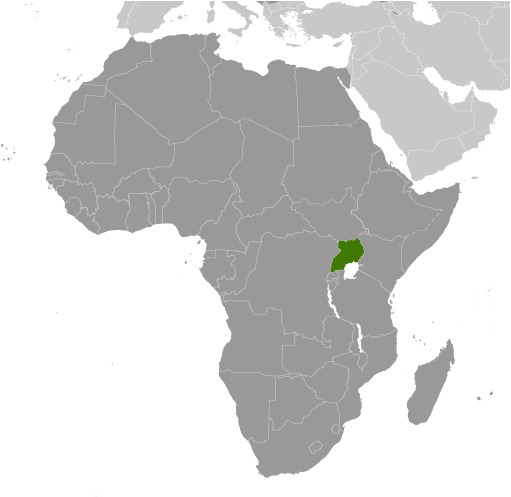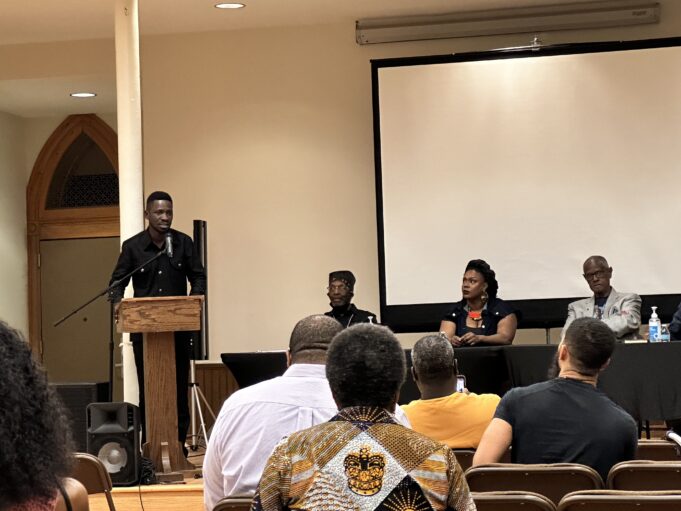WASHINGTON, D.C.—Ugandan politician and musician Bobi Wine came to the nation’s capital during the Congressional Black Caucus Annual Legislative Conference to ask politicians to stop funding the oppression of the Ugandan people. His National Geographic Documentary, “Bobi Wine: The Man, The Music and The Movement,” was screened at an event sponsored by the Institute for the Black World 21st Century.
“We are showing this to the world, not because we want you to come and help us, no, but we just want you to help stop sponsoring our death,” he told the audience. “All that you see happening (in the documentary) is courtesy of the taxpayers’ money the United States government gives to the tune of one billion U.S. dollars to the Museveni government every year.”
Yoweri Kaguta Museveni, 79, has been president of Uganda since 1986. Mr. Museveni was a Ugandan military officer, politician and revolutionary. According to AP, while Mr. Museveni is beloved by many Ugandans who credit him with bringing relative stability to the East African country, many others see him as an authoritarian who depends on the security forces to stay in power.
He and his son Muhoozi Kainerugaba were accused of sponsoring violence and abusing critics in testimony filed before the International Criminal Court in July. Some of these critics were allegedly interrogated about their links to Mr. Wine.
“Unfortunately, you did not see the brutality because it was about to start in the next, maybe three or five minutes from where we stopped. But those of you that will be able to see the rest of the film, you’ll see what your taxpayer’s money is doing. It is buying bullets instead of medicines. It’s buying tear gas instead of oxygen.

It is being used not to fix hospitals or schools, but to bribe those in the opposition and to ensure that we remain under subjugation forever. The people of Uganda who are largely young people are being enslaved in their country. We are modern-day slaves in Uganda,” Mr. Wine told the audience during the Sept. 21 event held at the historic Metropolitan AME Church.
Mr. Wine explained the atrocities his people face on a regular basis.
“Every day, hundreds of young girls are being shipped into the Arab world. Many of them returned dead. Many of them have reported of gross violations upon them in Uganda. We even have businesses of organ trade where somebody’s employed, but they’re actually not employed to work, but their organs are being sold. All that is happening.”
Uganda is a landlocked country located on the edge of the equator, positioned in south-central Africa, and bordered by the Democratic Republic of the Congo (DRC), Kenya, Rwanda, Sudan and Tanzania. President Museveni is the longest-serving president of Uganda. He replaced Idi Amin who presided from 1971 to 1979.
Ugandan opposition leader Robert Kyagulanyi, known as Bobi Wine has gone from pop star to the “people’s president,” and is the current leader of the National Unity Platform (NUP) and the People Power Movement. Born to working-class parents in the slums of Kampala, Bobi Wine is a former member of parliament, activist and famous musician.
He has made fighting what he calls Museveni’s ruthless regime, a cause célèbre. The elder statesman confronted with a worthy opponent in the 2021 presidential elections changed Uganda’s constitution to enable him to run for yet another five-year term.
National Geographic filmed how Bobi Wine’s presidential campaign used his music to denounce “the dictatorial regime and support his life mission to defend the oppressed and the voiceless people of Uganda.” Opposing the Museveni machine required confronting the country’s police and military, which used violence and torture to intimidate Wine and his supporters, some observers noted.
Mr. Wine leads the largest political opposition party in Uganda and has become the main opposition leader to President Museveni’s rule. “We’re not here to cry for mercy, but we have to plead our case and to say that you guys can help stop this. You the American taxpayers, you at least have the luxury of rights, you are listened to by your leaders. We request you to please reach out to your representatives, your congressmen and women, and ask them to change the policy on Uganda to stop sponsoring modern-day slavery, to stop sponsoring our death,” Mr. Wine said.
Dr. Ron Daniel, president of The Institute for the Black World 21st Century moderated the event that featured a panel that spoke on the work of Mr. Wine.
Dr. Julianne Malveaux, author, economist and educator, told Bobi Wine, “We need you. The average age on the African continent is under 40. That’s what we’re looking for.” She explained the need for elder politicians to pass the baton and move over for younger leadership.
“There is a war going on against our people, not just on the African continent or just in the U.S., but all over the world,” she said. “There’s some craziness going on. They want to erase our history, erase us, erase what has happened. We can’t let it happen.”
Kim Poole is a founding fellow of the Teaching Artist Institute. She provides opportunities for artists to learn techniques for social transformation while fostering outlets for socially engaged art. She’s currently working in Uganda.
“When I saw him (Bobi Wine) singing with the kids, it made my heart cry because I have kids right now in Uganda working with the Teaching Artist Institute. I have an 89-year-old elder, the only African American woman in Uganda with citizenship who supports Bobi Wine. She was afraid to come here because she said, ‘I can’t be seen.
I don’t know what will happen.’ When I get back home to Uganda, young people that work with me every day with the Teaching Arts Institute say, ‘Kim, how do I tell my story using the music?’” Ms. Poole shared.
She described the trauma youth experienced during the campaign, including the beatings, the raids and threats of imprisonment. But Ms. Poole said she welcomed the artistic value of the film.
“I understand that art and culture is (and) will be your power. However, when I saw this movie, I was disappointed when I watched your judge sit up under a blonde wig making a decision. I said, ‘What is the culture in Uganda? What does African culture in Uganda look like? What does an African attire look like? What does it look like when I sing Uganda songs.’ At least the film captured that much, but there’s so much more,” she added.
“It’s also imagining what is coming next,” she said. “There are new colonizers with Black skin that look just like you. You don’t know who’s your brother or who’s your kin because inside their mind and inside their heart, they’re European, they have been colonized. The question becomes, how do we train young people to think with the Pan-Africanist mind, how do we change their minds and their hearts?
It’s the art and it’s the culture that will connect and reach them.” The film, “Bobi Wine, The Man, The Music and The Movement” debuted October 5 on National Geographic and on Hulu and Disney + on Oct. 6.













